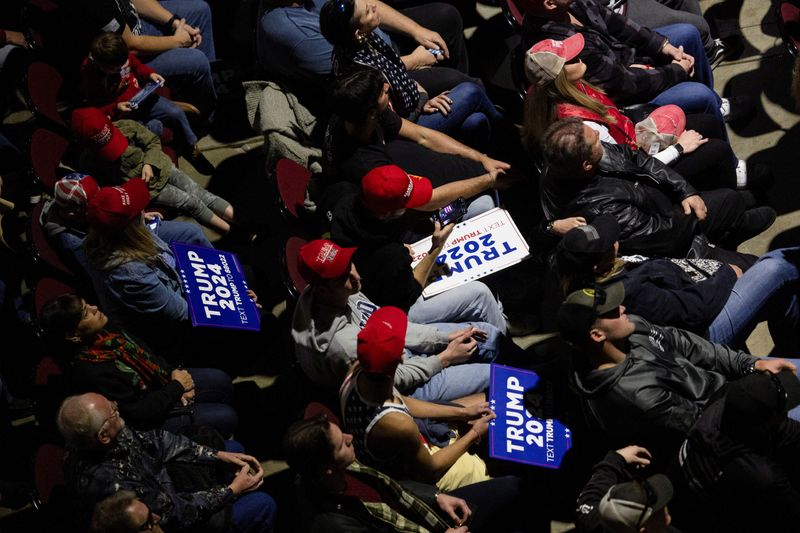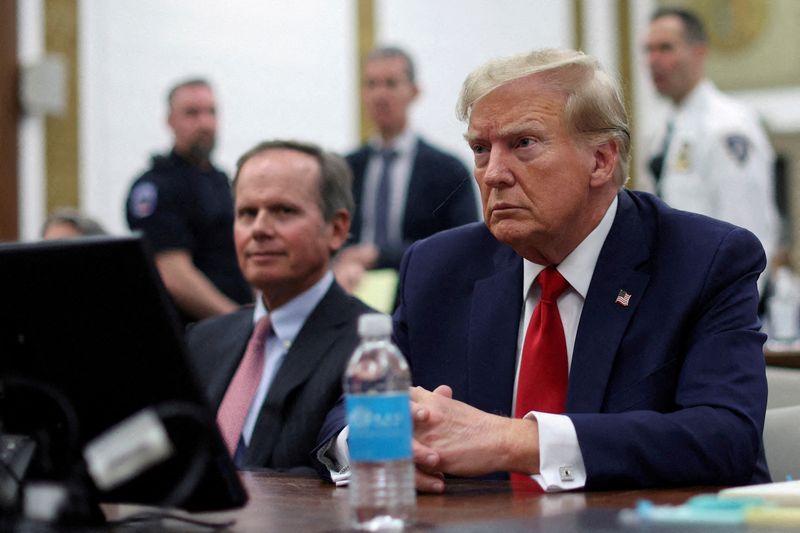By Jason Lange
WASHINGTON (Reuters) - About half of Republicans say the U.S. needs a strong president who is not unduly restrained by courts or Congress, a possible sign of support for Donald Trump's pitch that if re-elected he should be able to operate with minimal legal constraints, a new Reuters/Ipsos poll found.
The week-long poll, which closed on Tuesday, found Trump's Republican Party appears divided on where to draw the limits on presidential power that help define American democracy.
Forty-six percent of Republican respondents agreed with a statement that "the country is in a crisis and needs a strong president who should be allowed to rule without too much interference from courts and Congress," while the same share disagreed. The rest were unsure.
Among Democrats, 25% agreed with the statement, while 64% disagreed and the rest were unsure.
Trump, who is facing dozens of charges for alleged crimes committed during and after his 2017-2021 White House term, is currently arguing in federal court that he should be largely immune to prosecution for actions taken while in office. His lawyer told a panel of judges this week that a president who used commandos to assassinate a political rival could be prosecuted only if he had first been impeached by the House and convicted in the Senate.
While the poll question did not name Trump, some 47% of respondents who said they would vote for him if the presidential election were held today agreed with that statement. Some 23% of people who said they would vote for Biden said they agreed.
Among other crimes, prosecutors accuse Trump of using fraud to try to overturn his loss to Democrat Joe Biden in the 2020 presidential election.
Trump claims innocence on all counts and says criminal cases against him are "witch hunts" engineered by political foes including Biden.
The Reuters/Ipsos poll showed Biden and Trump, the frontrunner for the Republican nomination, were neck-and-neck, each getting 35% support and rest saying they were undecided or would vote for someone else or no one at all.
Trump's many legal challenges are a key risk for his shot at winning back the presidency, with 49% of independents saying they would not vote for him if he were convicted by a jury, compared to 12% who said they would still back him. Another 35% said they didn't know and 3% didn't answer the question.
Conviction could even cost Trump Republican votes. Twenty-eight percent of Republican respondents wouldn't support Trump if he were convicted, compared to 43% who said they would still back him and 28% who said they weren't sure.
'HARD TO HAVE A DEMOCRACY'
Trump has long cultivated a strongman image and last month told supporters he won't be a dictator if re-elected except "on day one."
The significant slice of Republicans seeking a largely unfettered president signals a potential weakening in U.S. democratic institutions, said Matthew MacWilliams, a political scientist at Comms Hub, a pro-democracy consultancy.
"It's hard to have a democracy when that attitude is afoot," said MacWilliams, who does research on public opinion and authoritarianism.
The Reuters/Ipsos poll also showed Republicans strongly embrace a hardline proposal for immigration policy that has been tied to Trump's campaign. Sixty-nine percent of Republicans said they agreed with a statement that "illegal immigrants should be arrested and put in detention camps while awaiting deportation hearings," compared to 21% of Democrats.
Trump has promised to carry out the largest deportation operation in U.S. history if re-elected and a former aide for immigration policy, Stephen Miller, recently advocated for immigrant detention camps in an interview with the New York Times.

Trump campaign advisor Jason Miller declined to comment on the Reuters/Ipsos poll findings on presidential power and immigration, instead repeating campaign positions that America is in decline under Biden in part because of "open borders and the weaponization of our justice system."
The Reuters/Ipsos poll, conducted online Jan. 3-9, surveyed 4,677 randomly-selected U.S. adults and had a margin of error of about two percentage points.
